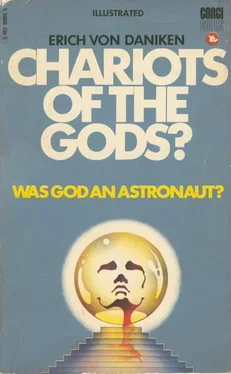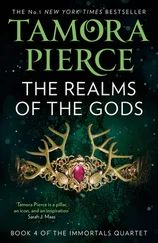Erich Daniken - Chariots of the Gods
Здесь есть возможность читать онлайн «Erich Daniken - Chariots of the Gods» весь текст электронной книги совершенно бесплатно (целиком полную версию без сокращений). В некоторых случаях можно слушать аудио, скачать через торрент в формате fb2 и присутствует краткое содержание. Жанр: Физика, на английском языке. Описание произведения, (предисловие) а так же отзывы посетителей доступны на портале библиотеки ЛибКат.
- Название:Chariots of the Gods
- Автор:
- Жанр:
- Год:неизвестен
- ISBN:нет данных
- Рейтинг книги:3 / 5. Голосов: 1
-
Избранное:Добавить в избранное
- Отзывы:
-
Ваша оценка:
- 60
- 1
- 2
- 3
- 4
- 5
Chariots of the Gods: краткое содержание, описание и аннотация
Предлагаем к чтению аннотацию, описание, краткое содержание или предисловие (зависит от того, что написал сам автор книги «Chariots of the Gods»). Если вы не нашли необходимую информацию о книге — напишите в комментариях, мы постараемся отыскать её.
Chariots of the Gods — читать онлайн бесплатно полную книгу (весь текст) целиком
Ниже представлен текст книги, разбитый по страницам. Система сохранения места последней прочитанной страницы, позволяет с удобством читать онлайн бесплатно книгу «Chariots of the Gods», без необходимости каждый раз заново искать на чём Вы остановились. Поставьте закладку, и сможете в любой момент перейти на страницу, на которой закончили чтение.
Интервал:
Закладка:
Erich Von Daniken
Chariots of the Gods
Introduction
It took courage to write this book, and it will take courage to read it. Because its theories and proofs do not fit into the mosaic of traditional archaeology, constructed so laboriously and firmly cemented down, scholars will call it nonsense and put it on the Index of those books which are better left unmentioned. Laymen will withdraw into the snail-shell of their familiar world when faced with the probability that finding out about our past will be even more mysterious and adventurous than finding out about the future.
Nevertheless one thing is certain. There is something inconsistent about our past, that past which lies thousands and millions of years behind us. The past teemed with unknown gods who visited the primaeval earth in manned space-ships. Incredible technical achievements existed in the past. There is a mass of know-how which we have only partially rediscovered today.
There is something inconsistent about our archaeology! Because we find electric batteries many thousands of years old. Because we find strange beings in perfect space suits with platinum fasteners. Because we find numbers with fifteen digits—something not registered by any computer. But how did these early men acquire the ability to create these incredible things?
There is something inconsistent about our religion. A feature common to every religion is that it promises help and salvation to mankind. The primitive gods gave such promises, too. Why didn't they keep them? Why did they use ultra-modern weapons on primitive peoples? And why did they plan to destroy them?
Let us get used to the idea that the world of ideas which has grown up over the millennia is going to collapse. A few years of accurate research has already brought down the mental edifice in which we had made ourselves at home. Knowledge that was hidden in the libraries of secret societies is being rediscovered. The age of space travel is no longer an age of secrets. Space travel, which aspires to suns and stars, also plumbs the abysses of our past for us. Gods and priests, kings and heroes emerge from the dark chasms. We must challenge them to deliver up their secrets, for we have the means to find out all about our past, without leaving any gaps, if we really want to.
Modern laboratories must take over the work of archaeological research.
Archaeologists must visit the devastated sites of the past with ultra-sensitive measuring apparatus.
Priests who seek the truth must again begin to doubt everything that is established.
The gods of the dim past have left countless traces which we can read and decipher today for the first time because the problem of space travel, so topical today, was not a problem, but a reality, to the men of thousands of years ago. For I claim that our forefathers received visits from the universe in the remote past. Even though I do not yet know who these extra-terrestrial intelligences were or from which planet they came, I nevertheless proclaim that these 'strangers' annihilated part of mankind existing at the time and produced a new, perhaps the first, homo sapiens.
This assertion is revolutionary. It shatters the base on which a mental edifice that seemed to be so perfect was constructed. It is my aim to try to provide proof of this assertion.
My book would not have been written without the encouragement and collaboration of many people. I should like to thank my wife, who has seen little of me at home during the last few years, for her understanding. I should like to thank my friend Hans Neuner, my travelling companion for many thousands of miles, for his unfailing and valuable help. I should like to thank Dr Stehlin and Louis Emrich for their continuous support. I should like to thank all the NASA personnel at Houston, Cape Kennedy and Huntsville who showed me round their magnificent scientific and technical research centres. I should like to thank Professors Dr Werhner von Braun, Dr Willy Ley and Bert Slattery. I should like to thank all the countless men and women around the globe whose practical help, encouragement and conversation made this book possible.
Erich Von Daniken
-----------------------
Chapter One - Are There Intelligent Beings In The Cosmos?
Is it conceivable that we world citizens of the twentieth century are not the only living beings of our kind in the cosmos? Because there is no homunculus from another star on display in a museum for us to visit, the answer 'Our earth is the only star with human beings' still seems to be legitimate and convincing. But the forest of question marks grows and grows as soon as we make a careful study of the fact resulting from the latest discoveries and research work.
On a clear night the naked eye can see about 4,500 stars, so the astronomers say. The telescope of even a small observatory makes nearly two million stars visible and a modern reflecting telescope brings the light from thousands of millions more to the viewer-specks of light in the Milky Way. But in the colossal dimensions of the cosmos our stellar system is only a tiny part of an incomparably larger stellar system-of a cluster of Milky Ways, one might say, containing some twenty galaxies within a radius of 1 1/2 million light years (1 light year = the distance travelled by light in a year, i.e. 186,000 x 60 x 24 x 365 miles). And even this vast number of stars is small in comparison with the many thousands of spiral Nebulae disclosed by the electronic telescope. Disclosed up to the present day, I should emphasise, for research of this kind is only just beginning.
The astronomer Harlow Shapley estimates that there are some 10 <20> stars within the range of our telescopes. When Shapley associates a planetary system with only one in a thousand stars, we may assume that it is a very cautious estimate. If we continue to speculate on the basis of this estimate and suspect the necessary conditions for life on only one star in a thousand, this calculation still gives a figure of 10 <14>. Shapley asks: how many stars in this truly 'astronomical' figure have an atmosphere suitable for life? One in a thousand? That would still leave the incredible figure of 10 <11> stars with the prerequisites for life. Even if we assume that only every thousandth planet out of this figure has produced life, there are still 100 million planets on which we can speculate that life exists. This calculation is based on telescopes using the techniques available today, but we must not forget that these are constantly being improved.
If we follow the hypothesis of the biochemist Dr S Miller, life and the conditions essential for life may have developed more quickly on some of these planets than on Earth. If we accept this daring assumption, civilisations more advanced than our own could have developed on 100,000 planets.
Professor Dr Willy Ley, the well-known scientific writer and friend of Wernher von Braun, told me in New York: 'The estimated number of stars in our Milky Way alone amounts to 30 milliards. The assumption that our Milky Way contains at least 18 milliard planetary systems is considered admissible by present-day astronomers. If we now try to reduce the figures in question as much as possible and assume that the distances between planetary systems are so regulated that only in one case in a hundred does a planet orbit in the ecosphere of its own sun, that still leaves 180 million planets capable of supporting life. If we further assume that only one planet in a hundred that might support life actually does so, we should still have the figure of 1-8 million planets with life. Let us further suppose that out of every hundred planets with life there is one on which creatures with the same level of intelligence as homo sapiens live. Then even this last supposition gives our 'Milky Way the vast number of 18,000 inhabited planets.'
Читать дальшеИнтервал:
Закладка:
Похожие книги на «Chariots of the Gods»
Представляем Вашему вниманию похожие книги на «Chariots of the Gods» списком для выбора. Мы отобрали схожую по названию и смыслу литературу в надежде предоставить читателям больше вариантов отыскать новые, интересные, ещё непрочитанные произведения.
Обсуждение, отзывы о книге «Chariots of the Gods» и просто собственные мнения читателей. Оставьте ваши комментарии, напишите, что Вы думаете о произведении, его смысле или главных героях. Укажите что конкретно понравилось, а что нет, и почему Вы так считаете.











